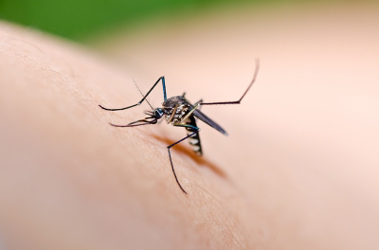Natural treatment and prevention tips for insect bites and stings.
Insect bites and stings can cause an immediate skin reaction. The bite from fire ants and the sting from bees, wasps, and hornets are usually painful. Bites caused by mosquitoes, fleas, and mites are more likely to cause itching than pain. Insect bites and stings can be simply divided into 2 groups: venomous and non-venomous. A sting is usually from an attack by a venomous insect such as a bee or wasp, which uses this as a defense mechanism by injecting toxic and painful venom through its stinger. Whereas non-venomous insect bites pierce the skin to feed on your blood. This usually results in intense itching.
Mosquito Bites
Mosquito bites are more annoying than dangerous. There are odd cases where the mosquito can carry a disease or virus such as west nile. However, these cases are very rare and the best prevention is to use a bug repellent that contains DEET to ward them off. Most people are slightly allergic to the saliva from a mosquito, thus resulting in the itchy red bump. However, some people have severe reactions that turn up within minutes of being bitten. These reactions include worsening asthma, hives, or anaphylaxis.
Symptoms of Insect Bites and Stings
The non-emergency symptoms vary according to the type of insect and the individual. Most people have localized pain, redness, swelling, or itching. You may also feel burning, numbness, or tingling.
Treatment for Insect Bites and Stings
1. Remove the stinger using a straight- edged object
2. Wash the area thoroughly with soap and water
3. Place ice wrapped in a cloth on the affected area
4. Repeat after every 10 minutes
5. Apply a gentle cream to prevent itching
6. Take anti histamines if necessary
7. Observe for signs of infection like pain, redness or swelling
Prevention Tips for Insect Bites and Stings
1. Try not to provoke insects. For example, avoid rapid, jerky movements around insect hives or nests.
2. Avoid perfumes, lotions, and scented soaps.
3. Avoid areas where you know insects are.
4. Use insect repellents and protective clothing. (See more details below)
5. Be careful when eating outdoors, especially with sweet drinks (such as sodas) or in areas near garbage cans.
6. To keep mosquito eggs from hatching, remove any standing water.
7. Mosquitoes are most active at dawn and dusk, so avoid being outside during those times.
8. Use citronella, linalool, and geraniol candles. In one study, citronella candles reduced the number of female mosquitoes caught in traps by 35%; linalool candles reduced female mosquitoes by 65%; and geraniol candles reduced female mosquitoes by 82%.
The Author:
herbalcureindia.com
Photo. Sweet Crisis
